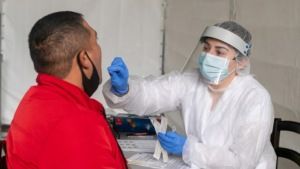News
Denmark ranks 23rd overall for coronavirus performance
This article is more than 4 years old.
Denmark’s disappointing position suggests things could have been different

PCR tests are still the best choice, but some quick options are almost as accurate (photo: Konstantin Ventslavovich)
New research from the Lowy Institute in Sydney has explored the responses of 98 countries to the coronavirus pandemic, looking at measures including numbers of confirmed cases, deaths, and tests carried out.
The data covers a period of 36 weeks and indicates ‘how well or poorly’ a country has managed the pandemic in the weeks following their hundredth confirmed case.
Mixed results in the Nordics
In the overall rankings Denmark placed 23rd. Elsewhere in the Nordics, Iceland managed an impressive seventh place, with Finland and Norway also ahead of Denmark in 17th and 18th respectively.
Sweden, meanwhile, trailed behind in 37th place. Far behind its neighbours, but still ahead of a number of other European nations – the UK was 66th, France was at 73 and Spain at 78.
The US sits fifth from bottom at 94.
A disappointing result
Commenting on Denmark’s performance, Flemming Konradsen – professor of global health at the University of Copenhagen – stated that the country had failed to make best use of its impressive test capacity: one of the highest in the world.
“Countries that have used their testing facilities for highly effective infection detection and containment are doing better. The faster you are able to respond to that data, the more efficient it is,” he told BT tabloid.
“For example, Norway and Iceland seem to have been skilled in this area.”
New Zealand leads the way
Sitting at the top of the rankings, New Zealand has successfully kept the virus largely away from its shores. The country was quick to close its borders and implement a hard, early country-wide lockdown.
“Even though we were quick to shut down and impose restrictions, we’ve probably been a bit late later on. If we are to learn anything from New Zealand, it is that it is better to suffer a short, difficult period than a long, drawn-out affair,” Konradsen mused.
Trust and support
Still, a place in the top third goes to show that things could be much, much worse than they currently are in Denmark.
Konradsen credits the responsiveness of the Danish population to restrictions, as well as the availability of government support, with preventing the pandemic from taking more of a hold in the country.
“A high level of trust in the state, and the presence of a leader that one believes in has the advantage of a population adhering more closely to restrictions,” he stated.










































